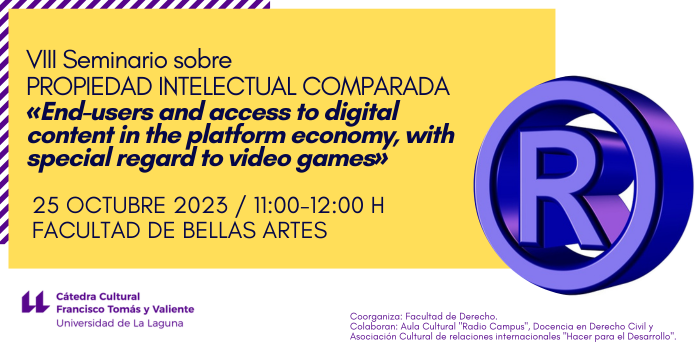Pabellón de Gobierno, C/ Padre Herrera s/n
Apartado Postal 456
38200, San Cristóbal de La Laguna
Santa Cruz de Tenerife - España
Tel. Centralita: (+34) 922 31 90 00
Horario: L-V, 8:00 a 21:00 h


La Cátedra Cultural «Francisco Tomás y Valiente» y la Facultad de Derecho organizan este seminario que se celebrará en la Facultad de Bellas Artes el 25 de octubre de 2023, de 11:00 a 12:00 horas.
El objetivo del seminario es el de introducir a la audiencia en las particularidades legales que, en materia de propiedad intelectual, se plantean en las plataformas telemáticas que ofrecen como servicio el acceso al uso y consumo de videojuegos.
El seminario será una exposición teórico-práctica en lengua inglesa, con participación activa del alumnado.
Video Games as Parts of Our Cultural Heritage
Video games are complex, sophisticated works of art that contain computer program code, i.e. software, graphic elements, musical compositions, sound recordings and other subject matter protected by copyright and related rights. Given that this is one of the most important entertainment products of our time, it is perhaps not surprising that our first thought is not to preserve games and the elements associated with their development and the gaming experience. It is perhaps not an exaggeration to say that we may not even think of video games as cultural heritage in the first place. Yet, if we consider the complex inner world of games and the social groups that play them, it is quite appropriate to examine whether these entertainment software are subject to the restrictions and exceptions laid down in the CDSM Directive, whether they are worthy of preservation, and whether there are institutions whose activities are directed towards collecting, organising, archiving and making them available for cultural purposes. Not only are video games worth preserving, but there are also institutions that systematically collect them. Indeed, to turn the question around, video games themselves can play an important role in the preservation and conservation of cultural heritage. In my study, I will take stock of the arguments for the preservation of video games as complex works forming part of the digital cultural heritage, with particular reference to the new exception in Article 6 of the CDSM Directive. I will further examine what efforts have already been made to preserve video games.
Platforms – Gatekeepers of Digital Marketplaces
A key feature of bilateral digital platforms is that they act as an intermediary between the content industry, other market players and end users. From the end-user’s point of view, flexibility, fast and preferably cheap access is a key requirement, which is hampered by a number of barriers. These barriers may be technical, such as geo-blocking based on geographic area, effective technical measures, or the software environment in which the actual interaction between end-users and the platform takes place. In this chapter, we explore from the end-user perspective the technological, contractual and legal environment that crucially determines the end-user’s ability to access content and information. Indeed, platforms act as a kind of gatekeeper, a distribution point for access to content and information. They collect and often produce the content and information that they transmit to end-users and channel end-user demand to the content industry and other actors. At the same time, they are responsible for compliance with and enforcement of the many and varied international, regional and national rules governing the flow of content and information. In this chapter, the central distribution role of platforms is examined from the end-user perspective. We will review a number of end-user contracts, looking for patterns in the relationship system illustrated in the diagram below, and also the relationship system between press publishers and platforms, which is crucial for the flow of information and mass media on the Internet.
Imparte: Imparte: István Harkai. Profesor Adjunto de Derecho de la Universidad de Szeged.
Dirección académica: Luis Javier Capote Pérez. Profesor de Derecho Civil, Departamento de Disciplinas Jurídicas Básicas de la ULL.
Coordina: Eva María González Lorenzo. Vocal de la Cátedra Cultural «Francisco Tomás y Valiente» de la Universidad de La Laguna.
CERTIFICADO DE ASISTENCIA: La ULL, a través del Vicerrectorado de Cultura y Extensión Universitaria, emitirá un certificado de asistencia a todas aquellas personas que participen, previa inscripción en la actividad.
Consulta el programa e inscríbete aquí.
Contacto: 922 319 616 / 922 319 626 – extuni@ull.es